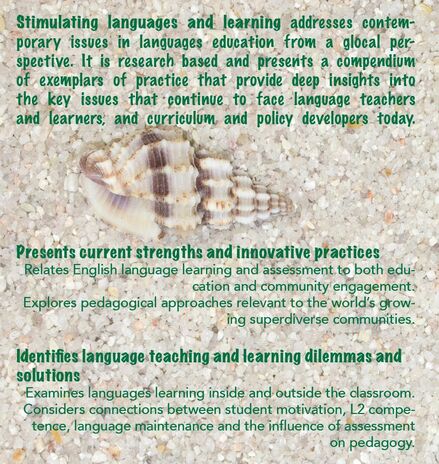Stimulating Languages and Learning
Global Perspectives and Community Engagement
Gavin Austin
Shirley O’Neill
University of Southern Queensland
Editors
|
Available in print on most online retailers
PDF (19$) available on our website |
Dr. Gavin Austin is a lecturer in applied linguistics in the School of Education at the University of Southern Queensland, Australia. His main area of research activity is second language acquisition, though he also has expertise in linguistic theory, quantitative research methods, discourse analysis, and Asian languages and linguistics. In addition to lecturing at tertiary level, Gavin has extensive experience as an English language instructor working in Japan and Australia.
Dr. Shirley O’Neill is Professor of Language and Literacies Education at the University of Southern Queensland, Australia. Her major interests are in TESOL, teacher metacognition, dialogic pedagogy and, AI and in formative assessment in pre-service teacher education. She has extensive experience in research and evaluation, assessment and teaching/teacher professional development, and has worked in schools in Australia and the UK, and in school review, curriculum and policy development and evaluation, and large scale student assessment. Her book Teaching English as a second language, written with Annabelle Gish, is widely used in preservice teacher education in Australia and internationally. It responds to the needs of English language education from a global, cross-cultural and interdisciplinary perspective, taking into account interactive/multimedia technologies, and ‘activist languages education’ to build students’ capacity through service learning through community engagement in superdiverse contexts. She is a foundation member and Vice President of the International Network for Language Education Policy Studies (INLEPS) conceived in Shanghai, 2013, following which she facilitated two conferences on deep languages learning in Australia. |
Acquisition of English as an added language is a worldwide challenge, and although a well-recognised educational need in a diversity of contexts, learners’ success largely depends on the quality of pedagogy and extent of reform away from the traditional method. Moreover, while learning environments differ in opportunities to foster English language learning, research continues to highlight how a multiplicity of issues may negatively impact learners’ success in spite of the advantages of new digital communication technologies and availability of teacher professional learning. In response to this, Stimulating Languages Learning: Global Perspectives and Community Engagement, as a research book, examines current shifts in the field, making connections and acknowledging identified strengths and innovative practices, and solutions, at both the local and global level. By drawing upon a range of exemplars from Australia, Indonesia, the Philippines, Senegal, South Korea, and Vietnam, it illuminates related issues, such as pre-service teacher education, refugee learners’ need for English for work, and the importance of first language maintenance. In highlighting the importance of curriculum, learner attributes and pedagogical approaches, learning materials and testing, along with opportunities for language learning outside the classroom, this publication is ideal for professionals involved in TESOL and teaching English as a Foreign language and its improvement.
ISBN 978-1-939755-48-3 (pb)
260 pages
|
|
Table of Contents
Foreword: Stimulating languages and learning: Global perspectives and community engagement - Indika Liyanage, Deakin University, Melbourne, Australia Introduction - Gavin Austin and Shirley O’Neill, University of Southern Queensland, Australia PART I LANGUAGE IN THE CLASSROOM: CURRICULUM Chapter 1 - Transformative curriculum in the French language classroom Florence Boulard, James Cook University, Australia Chapter 2 - The Philippine Indigenous Peoples’ curriculum Yoshi Budd, Charles Darwin University, Australia; Richel Hernandez, University of Southeastern Philippines PART II LANGUAGE IN THE CLASSROOM: PEDAGOGY Chapter 3 - Hallmarks of adolescent gifted English-language learners: Academic aspects - Aránzazu Blackburn and Linley Cornish, University of New England, Australia; Susen Smith, University of New South Wales, Australia Chapter 4 - Refugee action support: Deliberate pedagogy in the school community - Loshini Naidoo, Western Sydney University, Australia Chapter 5 - Effective language pedagogy of Madrasah Tsanawiyah English teachers following professional in-service teacher training in Indonesia - Moch. Imam Machfudi, State Institute of Islamic Studies (IAIN) Jember, Indonesia PART III LANGUAGE IN THE CLASSROOM: MATERIALS AND TESTING Chapter 6 - The world (and beyond) of a global ELT textbook: A critical image analysis - Linda Fitzgibbon, Queensland University of Technology, Australia Chapter 7 - Washback from English tests on teaching and learning: A case study in Vietnam - Nguyen Van Han, University of Southern Queensland, Australia; Nguyen Thi Hang, College of Customs and Finance, Vietnam; Henriette van Rensburg, University of Southern Queensland, Australia PART IV LANGUAGE OUTSIDE THE CLASSROOM Chapter 8 - The role of socio-psychological factors in the maintenance of Arabic language among the Arabic-speaking community in the regional city of Toowoomba, Australia - Mostefa Abdelhadi, University of Southern Queensland, Australia Chapter 9 - Motivations to learn English and their effectiveness in the professional context in Senegal - Ibrahima Diallo, University of South Australia Chapter 10 - Nonformal World Language and Culture Program: A Case Study -Dilnoza Khasilova and Jennifer Weatherford, University of Wyoming, USA |




